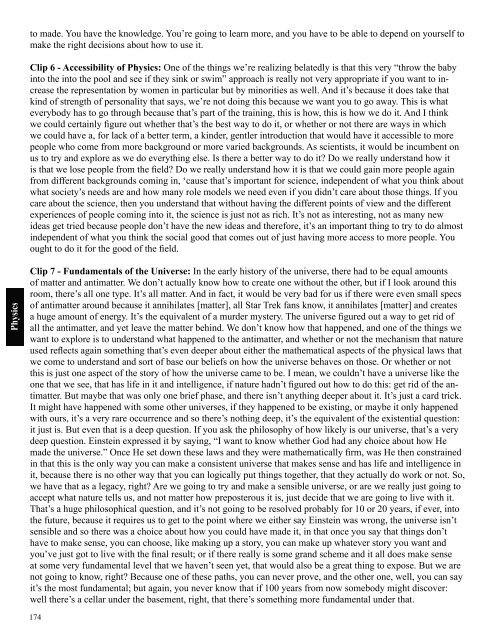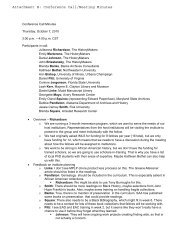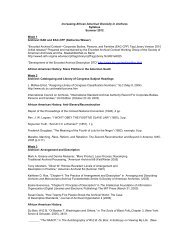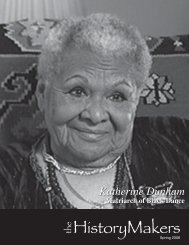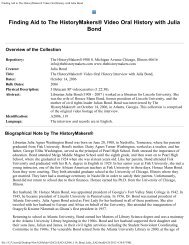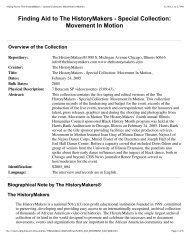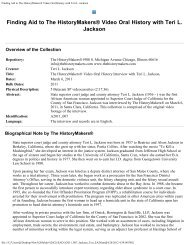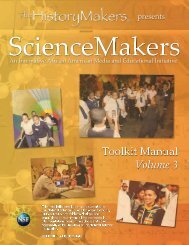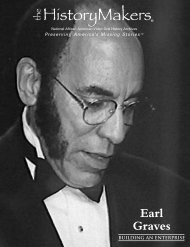ScienceMakers Toolkit Manual - The History Makers
ScienceMakers Toolkit Manual - The History Makers
ScienceMakers Toolkit Manual - The History Makers
Create successful ePaper yourself
Turn your PDF publications into a flip-book with our unique Google optimized e-Paper software.
Physics<br />
to made. You have the knowledge. You’re going to learn more, and you have to be able to depend on yourself to<br />
make the right decisions about how to use it.<br />
Clip 6 - Accessibility of Physics: One of the things we’re realizing belatedly is that this very “throw the baby<br />
into the into the pool and see if they sink or swim” approach is really not very appropriate if you want to increase<br />
the representation by women in particular but by minorities as well. And it’s because it does take that<br />
kind of strength of personality that says, we’re not doing this because we want you to go away. This is what<br />
everybody has to go through because that’s part of the training, this is how, this is how we do it. And I think<br />
we could certainly fi gure out whether that’s the best way to do it, or whether or not there are ways in which<br />
we could have a, for lack of a better term, a kinder, gentler introduction that would have it accessible to more<br />
people who come from more background or more varied backgrounds. As scientists, it would be incumbent on<br />
us to try and explore as we do everything else. Is there a better way to do it? Do we really understand how it<br />
is that we lose people from the fi eld? Do we really understand how it is that we could gain more people again<br />
from different backgrounds coming in, ‘cause that’s important for science, independent of what you think about<br />
what society’s needs are and how many role models we need even if you didn’t care about those things. If you<br />
care about the science, then you understand that without having the different points of view and the different<br />
experiences of people coming into it, the science is just not as rich. It’s not as interesting, not as many new<br />
ideas get tried because people don’t have the new ideas and therefore, it’s an important thing to try to do almost<br />
independent of what you think the social good that comes out of just having more access to more people. You<br />
ought to do it for the good of the fi eld.<br />
Clip 7 - Fundamentals of the Universe: In the early history of the universe, there had to be equal amounts<br />
of matter and antimatter. We don’t actually know how to create one without the other, but if I look around this<br />
room, there’s all one type. It’s all matter. And in fact, it would be very bad for us if there were even small specs<br />
of antimatter around because it annihilates [matter], all Star Trek fans know, it annihilates [matter] and creates<br />
a huge amount of energy. It’s the equivalent of a murder mystery. <strong>The</strong> universe fi gured out a way to get rid of<br />
all the antimatter, and yet leave the matter behind. We don’t know how that happened, and one of the things we<br />
want to explore is to understand what happened to the antimatter, and whether or not the mechanism that nature<br />
used refl ects again something that’s even deeper about either the mathematical aspects of the physical laws that<br />
we come to understand and sort of base our beliefs on how the universe behaves on those. Or whether or not<br />
this is just one aspect of the story of how the universe came to be. I mean, we couldn’t have a universe like the<br />
one that we see, that has life in it and intelligence, if nature hadn’t fi gured out how to do this: get rid of the antimatter.<br />
But maybe that was only one brief phase, and there isn’t anything deeper about it. It’s just a card trick.<br />
It might have happened with some other universes, if they happened to be existing, or maybe it only happened<br />
with ours, it’s a very rare occurrence and so there’s nothing deep, it’s the equivalent of the existential question:<br />
it just is. But even that is a deep question. If you ask the philosophy of how likely is our universe, that’s a very<br />
deep question. Einstein expressed it by saying, “I want to know whether God had any choice about how He<br />
made the universe.” Once He set down these laws and they were mathematically fi rm, was He then constrained<br />
in that this is the only way you can make a consistent universe that makes sense and has life and intelligence in<br />
it, because there is no other way that you can logically put things together, that they actually do work or not. So,<br />
we have that as a legacy, right? Are we going to try and make a sensible universe, or are we really just going to<br />
accept what nature tells us, and not matter how preposterous it is, just decide that we are going to live with it.<br />
That’s a huge philosophical question, and it’s not going to be resolved probably for 10 or 20 years, if ever, into<br />
the future, because it requires us to get to the point where we either say Einstein was wrong, the universe isn’t<br />
sensible and so there was a choice about how you could have made it, in that once you say that things don’t<br />
have to make sense, you can choose, like making up a story, you can make up whatever story you want and<br />
you’ve just got to live with the fi nal result; or if there really is some grand scheme and it all does make sense<br />
at some very fundamental level that we haven’t seen yet, that would also be a great thing to expose. But we are<br />
not going to know, right? Because one of these paths, you can never prove, and the other one, well, you can say<br />
it’s the most fundamental; but again, you never know that if 100 years from now somebody might discover:<br />
well there’s a cellar under the basement, right, that there’s something more fundamental under that.<br />
174


